Laptop Mag Verdict
The Droid Turbo combines very fast performance and long battery life in a durable design, making it a solid choice for Verizon shoppers.
Pros
- +
Vibrant quad-HD screen
- +
Swift Snapdragon 805 CPU
- +
Durable design
- +
Very good battery life
Cons
- -
Camera is sluggish and struggles in low light
- -
Below-average screen brightness
- -
Verizon and Amazon bloatware
Why you can trust Laptop Mag
Don't be fooled by the Droid Turbo's name. Yes, this Verizon exclusive has speed, thanks to its inclusion of the latest Snapdragon 805 processor. But it's really about staying power. Motorola brags that this handset ($200 on contract) delivers up to 48 hours of unplugged time. When you finally run low, that turbo goodness kicks back in again, with a charger that's supposed to deliver hours of juice in just 15 minutes. Add in a 21-megapixel camera, a quad-HD screen and a body tough enough to laugh in the face of a case, and you have a seriously tempting flagship. But does this Droid do enough to win us over?
Design
Durability comes first; looks come second. That's how I think of the Droid Turbo. The phone comes in two finishes: ballistic nylon reinforced with aluminum, or metallized glass fiber with a Kevlar back cover. Both materials are designed to withstand short drops and flexing, but the ballistic nylon has a more gritty texture, and the metallized glass fiber version is smooth. I tested the glass fiber version in red, and it's crisscross pattern on the back pops more than on the boring black model.
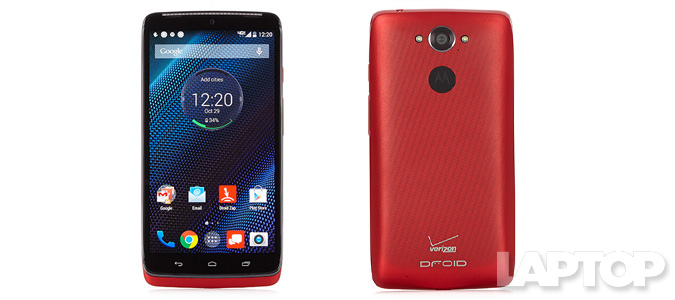
I didn't think twice about tossing this phone on top of a bar or sitting while the Turbo was in my back pocket. The Turbo's toughness extends to the scratch-resistant, Gorilla Glass 3 display as well as to its water-resistant nano coating. You can't submerge this device like the Samsung Galaxy S5, but it should be able to shrug off a quick rain shower or spill. Note that Motorola and Verizon don't make any claims about durability, such as a Mil-Spec rating.

Motorola wisely placed the power button on the right side of the Turbo, to put it within easy reach of your thumb, complete with a grooved finish that's easy to find by feel. The same thing goes for the volume bar beneath it. Unlike the Moto X, which uses on-screen navigation buttons that eat up real estate, the Turbo gets three dedicated capacitive keys for Back, Home and Recent Apps, beneath the 5.2-inch screen.
MORE: Smartphone Buying Guide: What You Need to Know Before You Buy
It's a good thing you probably won't need a case, because the Droid Turbo is hefty. It weighs 6 ounces, which is significantly more than the 5.1-ounce Galaxy S5 (5.1-inch display) and 4.6-ounce iPhone 6 (4.7-inch screen). Even the all-metal HTC One M8 is lighter, at 5.6 ounces. Nevertheless, the Droid Turbo's contoured edges make this phone fairly easy to operate with one hand.
Battery Life
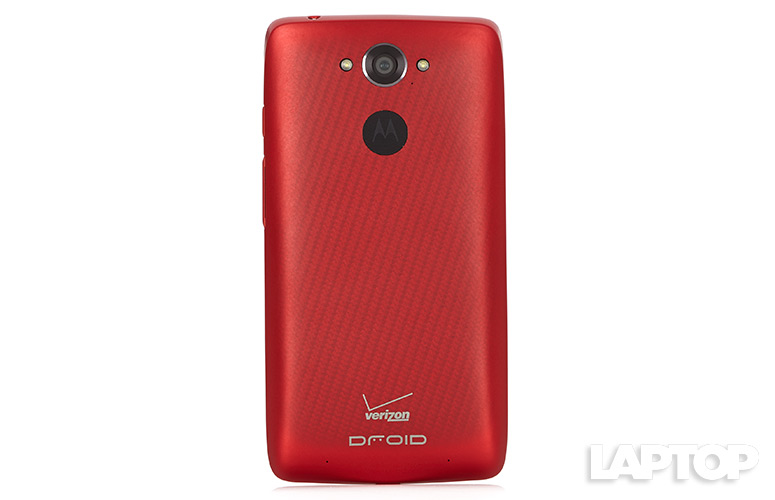
Click to EnlargeThe Droid Turbo has a 3,900-mAh battery, which is the largest capacity I've seen on a U.S. smartphone. As expected, the handset turned in an impressive performance on our battery test, which involved continuous 4G Web surfing on Verizon's network at 150 nits of screen brightness. It lasted 9 hours and 30 minutes, which beats the Verizon Samsung Galaxy S5 (8:25) and average smartphone (8:22) by about an hour. The Turbo also blew past the Verizon iPhone 6, which lasted only 7:27.
However, Verizon's HTC One M8 delivered a longer runtime than the Turbo (9:52), and the iPhone 6 Plus on AT&T lasted an even longer 10 hours. To be fair, the Droid Turbo pushes more pixels on its quad-HD screen, compared to full HD for all of the other aforementioned handsets. The Galaxy Note 4, which also has a quad-HD display, lasted 8:43 on AT&T.
MORE: 10 Smartphones with the Longest Battery Life
In everyday use, the Turbo was a true marathon runner, but I wouldn't expect it to last 48 hours on a charge, as Motorola claims. After I unplugged the device at 5 a.m. and used the phone periodically throughout the day, the phone said it had 36 percent battery capacity left at 11 p.m. I still had more than 20 percent juice left the next morning.
Turbo Charging
Motorola says you can get 8 hours of battery life from the Droid Turbo after just 15 minutes of charging. It did juice up fairly quickly. Using the somewhat bulky wall charger, the device reached 16 percent capacity after 15 minutes. If you go by our harsh battery test, that translates to just 1 hour and 31 minutes of heavy use.
Display
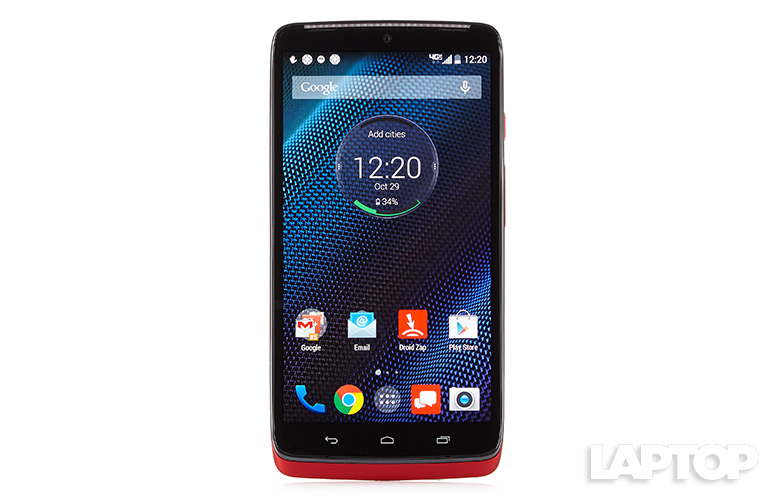
Click to EnlargeAmong top-tier Android phones, quad-HD displays are becoming de rigueur, and the Droid Turbo joins the party with a 5.2-inch, 2560 x 1440-pixel Super AMOLED panel. If you like rich colors, you'll love the palette this display delivers. In a 4K trailer of The Hobbit: The Battle of the Five Armies, Smaug's breath was a fiery explosion of red and orange, and I could make out every wrinkle on Ian McKellen's war-weary face.
The quad-HD resolution came in handy while I zoomed in on pictures I snapped with the Droid Turbo's 21-megapixel camera, even though the resolution of the stills (5248 x 3936 pixels) was higher than what the display could handle.
The Droid Turbo proved plenty bright while I used it as a GPS navigator in my car on a sunny day, but it didn't shine as bright as the iPhone 6 while I was walking around in direct sunlight to check NFL scores. Our test results back this up, as the Turbo averaged 263 nits of brightness using our colorimeter, compared to a whopping 504 nits for the iPhone 6. The Galaxy S5 (347 nits) and HTC One M8 (368 nits) are also brighter.
MORE: 15 Best Apps That Aren't on Android
Similar to other phones with AMOLED displays, the Droid Turbo produced more than 100 percent of the sRGB color gamut, registering 165 percent. That's not necessarily a bad thing if you like oversaturated hues. The Galaxy S5 (156.3 percent) was in the same ballpark, while the iPhone 6 hit 96.8 percent.
The Turbo fell flat on our color accuracy test, recording a Delta-E rating of 5.9 (closer to 0 is better). The iPhone 6 scored a better 3.6, and the S5 registered a near-perfect 0.9.
Audio
The Droid Turbo's front-facing speaker, located above the display, doesn't get very loud, but it delivers high-quality audio. When I streamed Outkast's "Hey Ya!" side by side on the Droid Turbo and the iPhone 6, Apple's handset delivered considerably more volume. However, two onlookers said the Turbo delivered more well-rounded sound with a better bottom end.
Interface
Similar to the Moto X, the Droid Turbo runs Android 4.4 KitKat, and Motorola promises that this handset will see an update to the latest and greatest Android 5.0 Lollipop by the end of 2014. That will bring such enhancements as Google's more colorful and user-friendly Material design, enhanced notifications and improved quick settings.
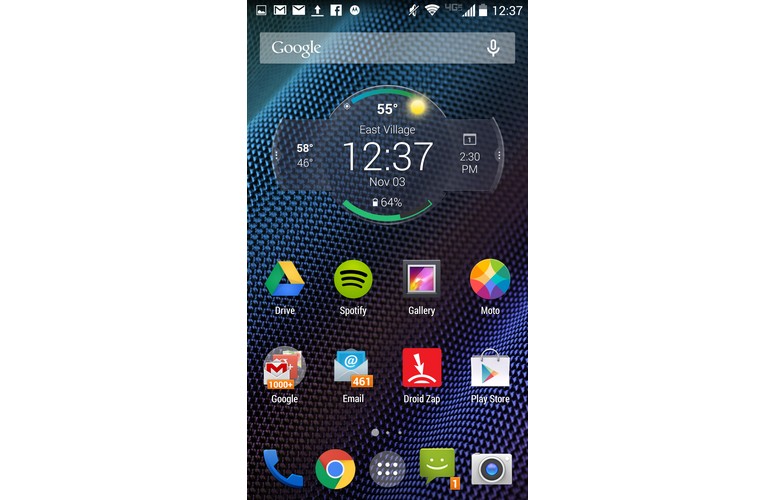
Click to EnlargeBut for now, the Turbo's interface is fairly spartan. That's mostly a good thing for those who don't like skins like Samsung's TouchWiz, but I missed certain features. For instance, the Quick Settings menu doesn't have a slider for the brightness control; instead, you have to tap the Brightness button and then adjust the level. You'll find only eight quick settings, compared to 20 on the Galaxy S5 (10 visible, 10 hidden).
The main home screen on the Droid Turbo sports an expandable clock widget that packs a lot of info into a small space, including the current temperature, forecast, battery level and when your next appointment is.
You'll find two more home screens to the right -- one with a big Amazon widget/ad for accessing content and another that includes a Verizon widget that provides quick access to your account and help, and displays your battery level (again?) and amount of free storage.
Typing on the Droid Turbo's stock Android keyboard was quick, complete with light haptic feedback, and trace typing worked smoothly. However, I missed having the dedicated number row that's included on the Galaxy S5.
The Moto Actions gestures literally came in handy during my testing, allowing me to wave in front of the phone to snooze the alarm or to silence calls. I also liked the twist-to-capture gesture for firing up the camera.
Moto Voice and Moto Display
If you're willing to spend just a couple of minutes to train the Droid Turbo, it will reward you with a very capable -- albeit somewhat slow -- voice assistant. After recording my own wake-up phrase in a very quiet setting (I chose "OK, Droid Turbo"), I could use Moto Voice to ask about the weather, send a text and even play certain artists on Spotify, just by barking commands.
MORE: Best Siri Alternatives Tested
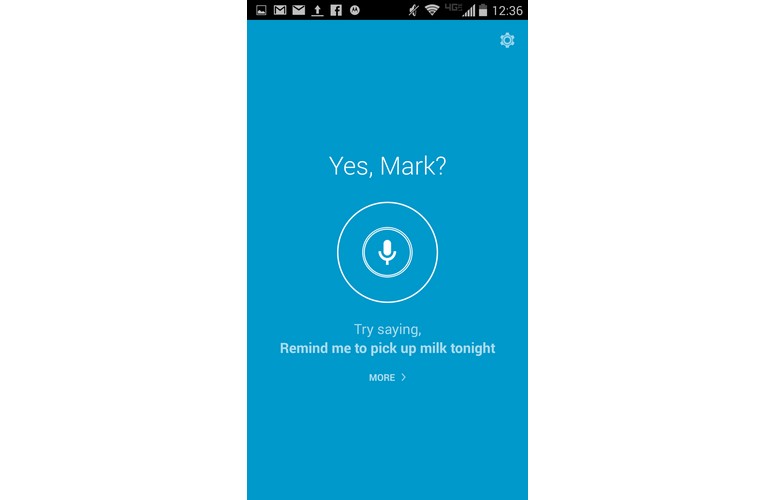
Click to EnlargeMotorola includes a list of commands you can use, including "Take a selfie," "What's the song?" and "Send WhatsApp message." Google Now/Voice can do a lot of the same things as Moto Voice, and it often integrates with the service. But Google Now can't automatically take a selfie or do things like show your Verizon data usage or post to Facebook. The Droid Turbo took a few seconds to process my utterings, but it generally proved accurate.
Moto Display is another useful feature; it presents notifications icons on your screen, to keep you abreast of email, texts, Facebook updates and more. When you tap the icon, the phone displays the message, and you can unlock right to it by swiping up. The iPhone 6 lets you display full messages on your lock screen, but it uses more power because it lights up the whole screen. The Turbo shows only black-and-white icons.
Performance
The Droid Turbo packs the fastest CPU you'll find on an Android phone right now: the 2.7-GHz Snapdragon 805, which is complemented by 3GB of RAM. The device comes with 32GB of storage, which you can't expand. If you want 64GB, you'll have to spend $100 more.
In terms of everyday performance, the Turbo fired up its camera a hair faster than the iPhone 6, and it was faster to return to the home screen from apps. Flipping through photos in the gallery also proved buttery smooth. Because the iPhone 6 is usually among the fastest smartphones to accomplish these tasks, I can say with confidence that the Turbo is one of the fastest and most responsive smartphones ever.

The Droid Turbo smoked other Android phones on our video editing test, in which we transcode a short HD video. The Motorola took just 4 minutes and 16 seconds, which is a full minute faster than the Galaxy Note 4 (5:15), which has the same processor. The Galaxy S5 took 5:07, and the One M8 took 5:00.
On Geekbench, which measures multicore performance, the Turbo notched 2,938. That's on a par with the iPhone 6 Plus (2,903) but behind the Galaxy Note 4 (3,124). The Droid Turbo performed even better on the 3D Mark Ice Storm Unlimited graphics test, posting 21,187. That's higher than the Note 4 (20,126), iPhone 6 Plus (16,965) and Galaxy S5 (18,204).
Cameras
If there's one thing that's definitely not Turbo about this phone, it's the camera. I found the shutter speed surprisingly sluggish, to the point where I didn't trust this device to capture shots of my son blowing out his birthday candles. In my office, the Droid Turbo often took more than a second to take stills, compared to the near-instantaneous shutter speed on the iPhone 6.
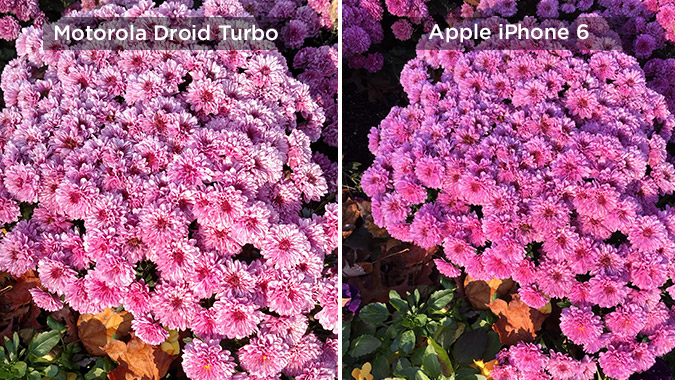
Despite having 21 megapixels at its disposal, the Droid Turbo's camera didn't take the best-looking photos. For instance, a close-up of mums looked a tad overexposed, compared to a more lush purplish-pink on the iPhone 6. Nevertheless, I could zoom in a lot more on the sharper Turbo shot, because it captures more detail.

In another photo taken of Times Square at dusk, the Droid Turbo delivered a brighter image overall, especially in the street and sky. But the iPhone 6 better represented the bright signs and other details that the Turbo blew out.
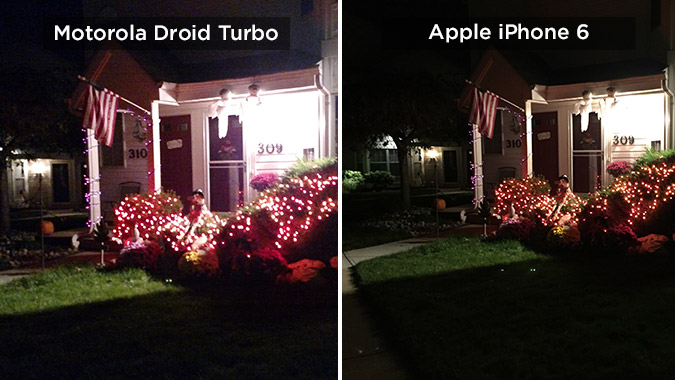
The Turbo struggles mightily in low light. A photo I snapped of a home with Halloween decorations looked noticeably grainy, and the orange lights around the trees looked too bright. On the iPhone 6, the same image looked clearer, and the lights had the right color.

I saw better results from the front 2-MP camera, which did a fine job of capturing the vertical lines in my corduroy jacket.
Apps
Although the Droid Turbo is almost Nexus-like in its lack of a skin, the app selection reminds you that this is very much a carrier-branded device. Verizon stuffs this handset with all sorts of Amazon apps, including Amazon for shopping, Amazon Appstore, Amazon Kindle, Amazon Music and Audible. I could do without all of them except Kindle.
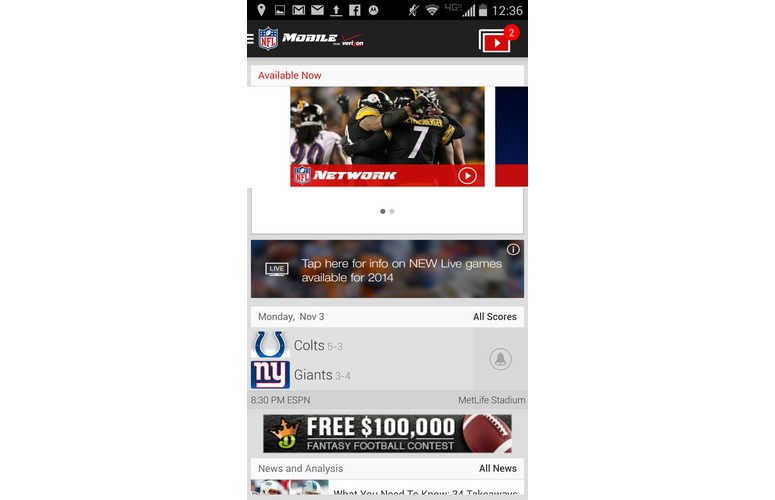
Click to EnlargeVerizon gets into the act, too, by preloading VZ Navigator, VZ Protect (malware and blocking risky websites), Caller Name ID, Verizon Cloud, Message+, Mobile Hotspot, My Verizon Mobile and NFL Mobile. The only apps I would keep are My Verizon (for checking usage) and NFL Mobile.
Verizon doesn't stop there, though; it throws in third-party apps like Slacker Radio and Softcard (for mobile payments).
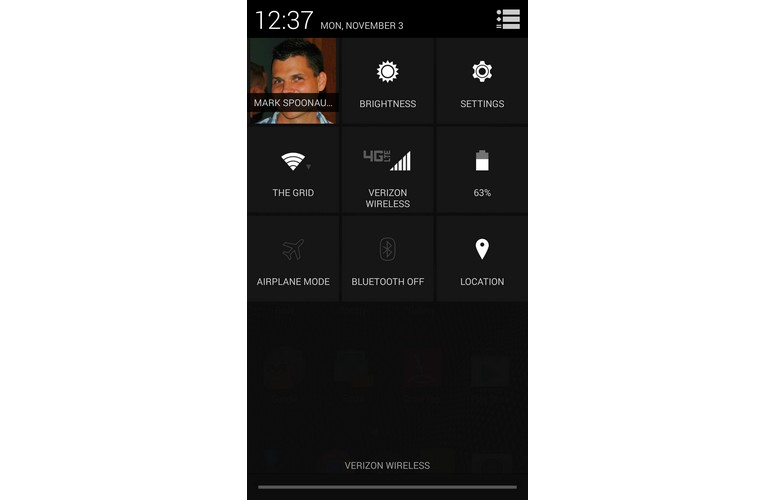
Click to EnlargeAt least Motorola's apps add some value. In addition to Moto Voice and Moto Display, you'll find Moto Assist for automatically adjusting various settings based on what you're doing, whether it's sleeping, driving or attending a meeting. For instance, for the Meeting setting, you can keep the Turbo quiet and let only certain callers through, or autoreply to people in your Favorites list.
Last but not least, Droid Zap lets you share images and videos with other nearby users who happen to have the same app downloaded.
Bottom Line
The Droid Turbo does three things exceedingly well: It delivers lots of speed, lasts a long time on a charge -- about 2 hours longer than the iPhone 6 -- and it's built to stand up to abuse. You likely won't need a case to protect this Verizon exclusive. However, although the 21-MP camera captures lots of detail, it's too slow to fire. And while the 5.2-inch quad-HD screen is quite sharp and colorful, it's not as bright as competing phones' displays.
Among Verizon smartphones in the same price range, the iPhone 6 offers a better camera and brighter screen, though it's smaller and lower-res. The Galaxy S5 boasts real water resistance and has more features, like a fingerprint sensor and a heart-rate monitor. It also takes better pictures, and I prefer the way it combines the quick settings and notifications menu. But if you prefer a cleaner, leaner build of Android and want a smarter voice assistant, the Droid Turbo is a premium smartphone worth owning.
Motorola Droid Turbo Specs
| Bluetooth Type | Bluetooth 4.0 LE |
| Brand | Motorola |
| CPU | 2.7-GHz Qualcomm Snapdragon 805 |
| Camera Resolution | 21 MP |
| Carrier | Verizon |
| Display (main) | 5.2-inch Super AMOLED/2560 x 1440 |
| Display Resolution | 2560 x 1440 |
| Form Factor | Candybar Touchscreen |
| Front Camera Resolution | 2 MP |
| GPS | Yes |
| Internal Memory | 32GB |
| Memory Expansion Type | none |
| OS Family | Android |
| Operating System | Android 4.4.4 |
| Phone Display Size | 5.2 |
| Ports | 3.5mm headphone, microUSB |
| Processor Family | Qualcomm Snapdragon 805 |
| RAM | 3GB |
| Size | 5.65 x 2.89 x 0.33-0.44 inches |
| Weight | 6 ounces |
| Wi-Fi | 802.11 a/b/g/n/ac |

